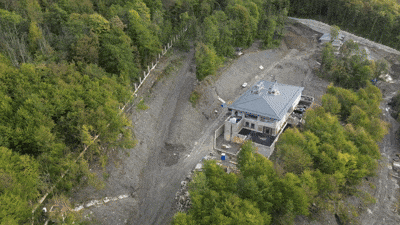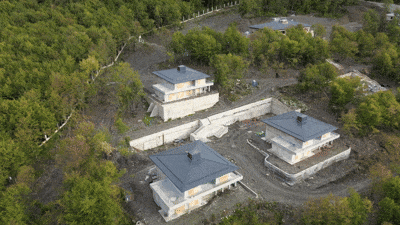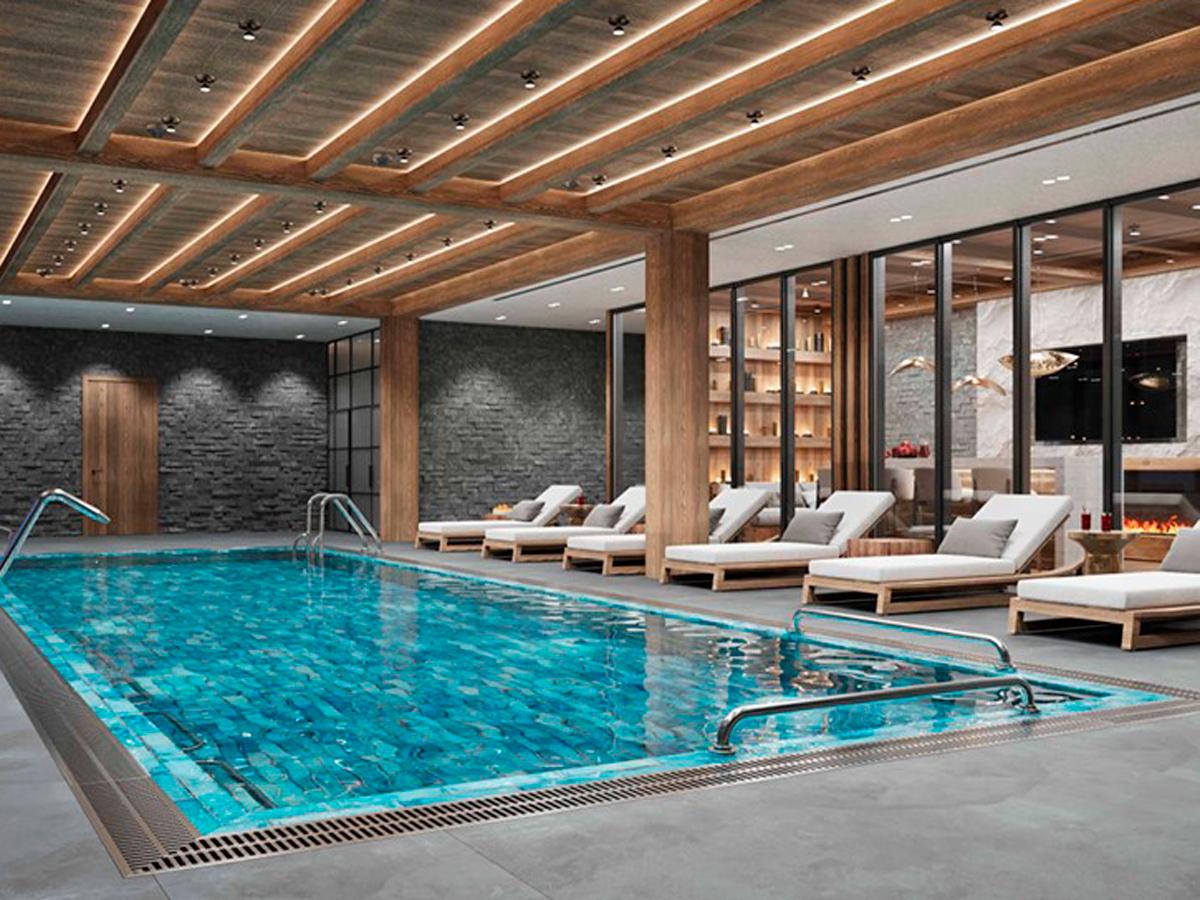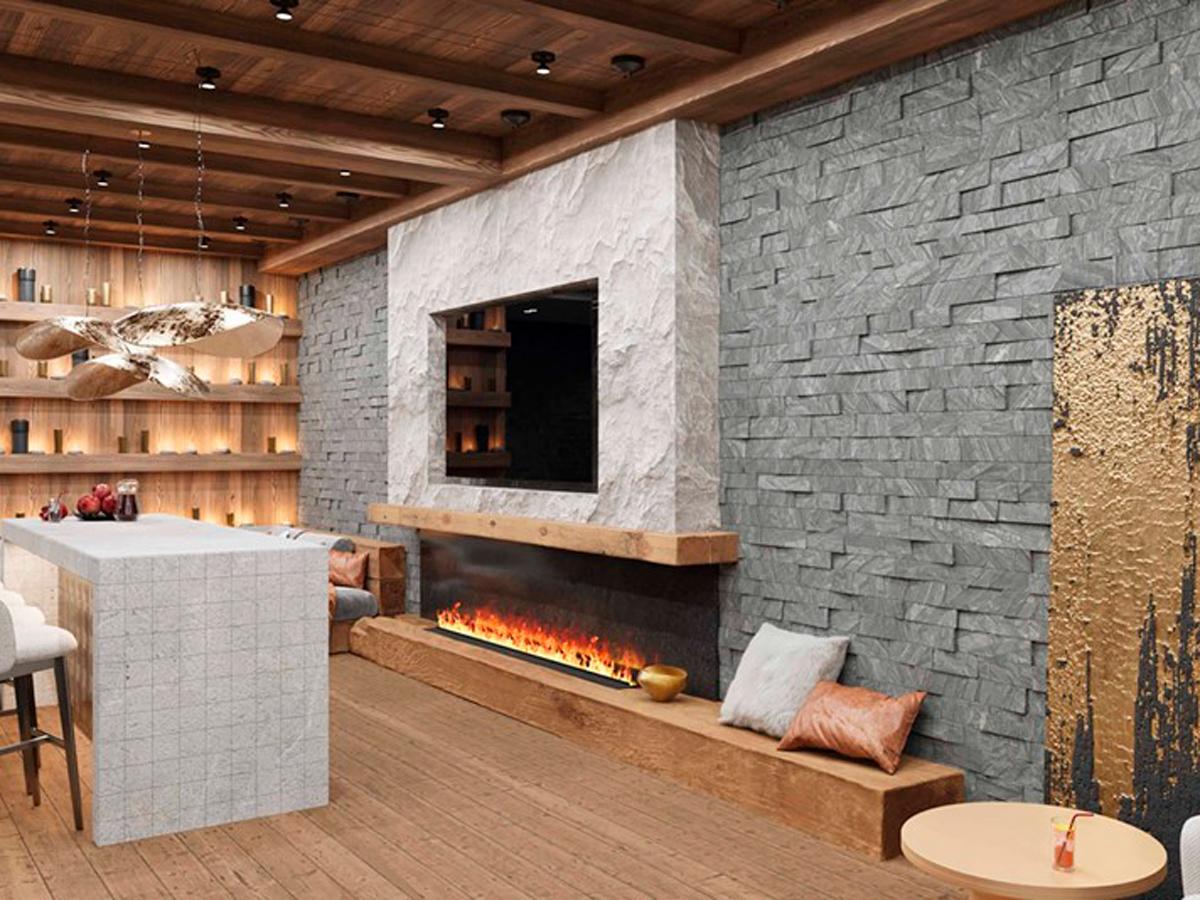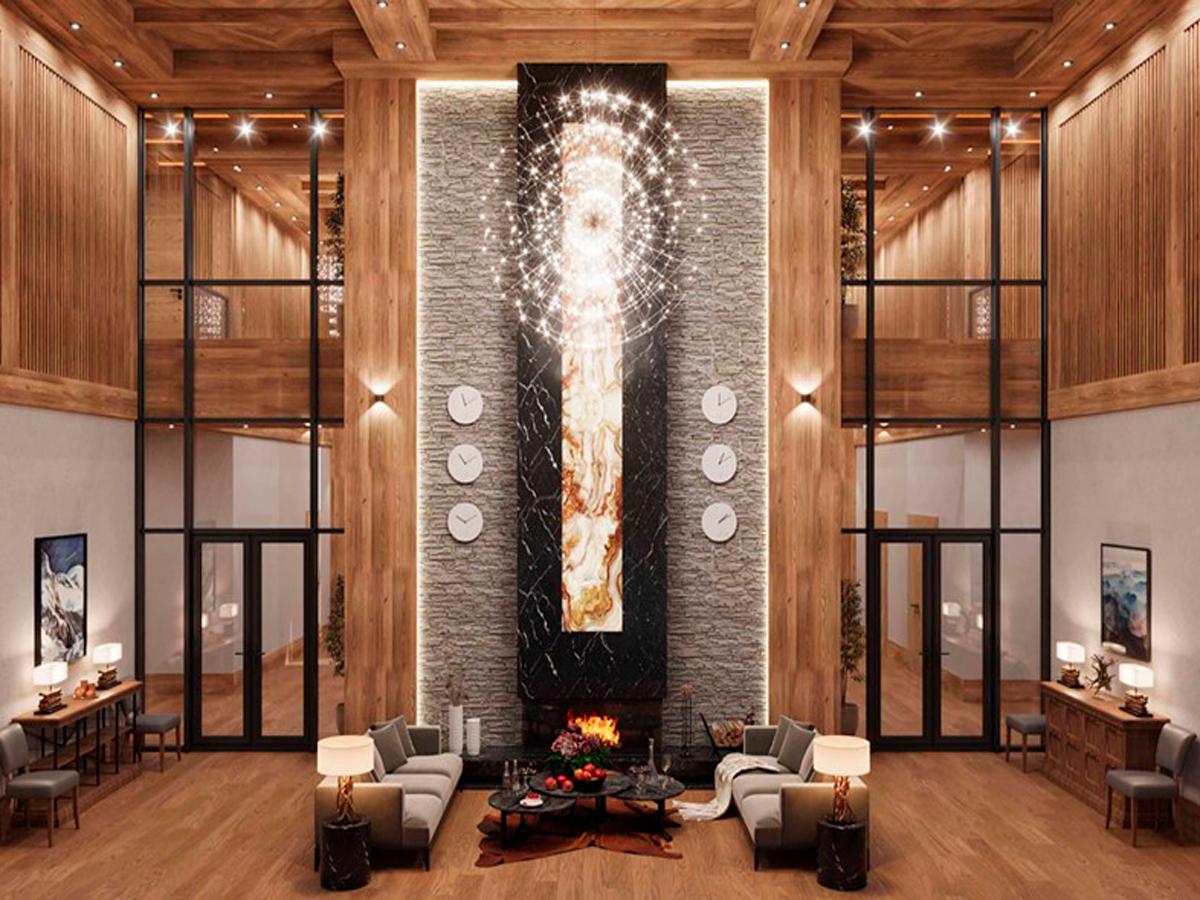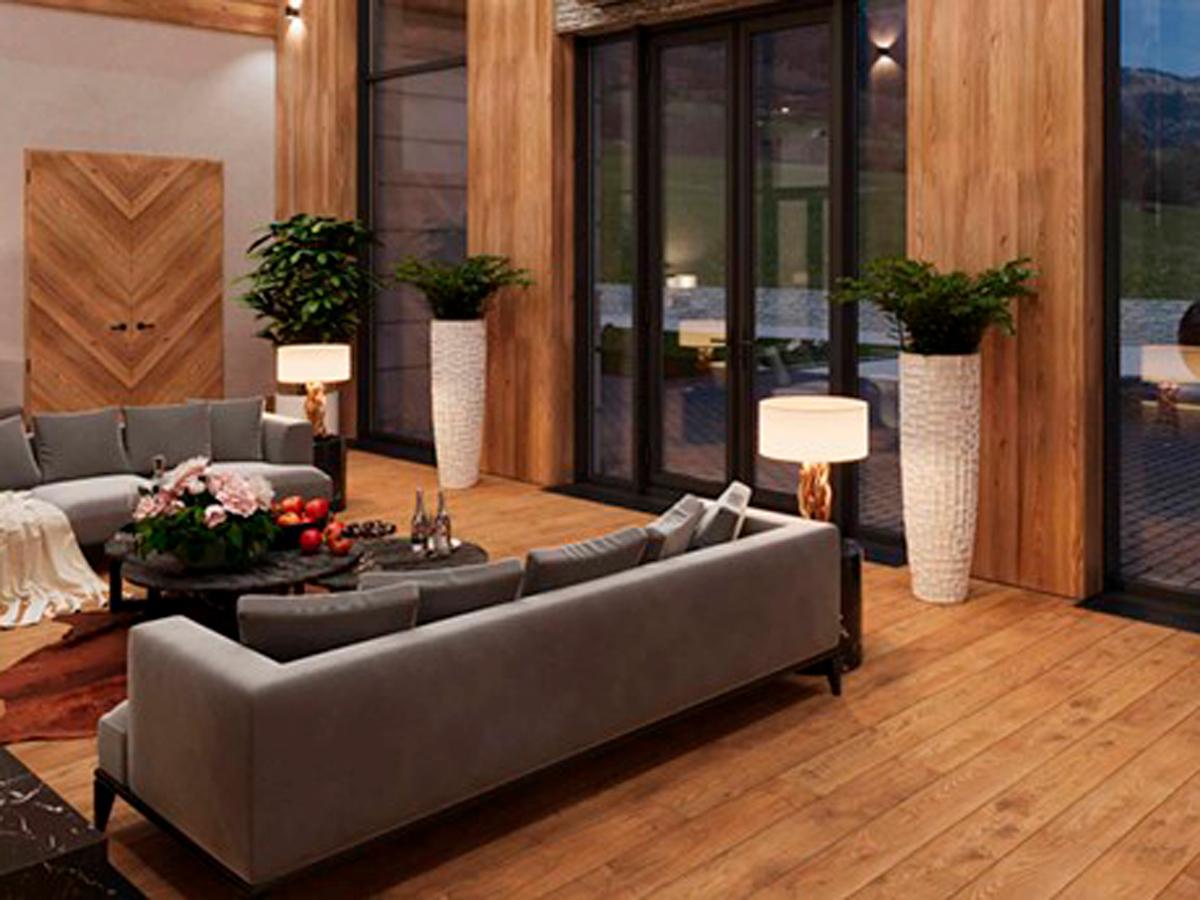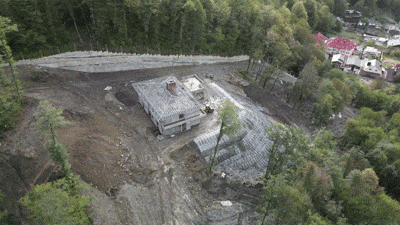This investigation reveals what appears to be a secret presidential residence being built for Alexander Lukashenko in Russia's luxury ski resort of Krasnaya Polyana, near Sochi, disguised as a hotel complex.
The Hidden Fortress
BIC obtained exclusive photographs and videos showing a massive 10-hectare construction site behind high fences and multi-layered security systems. While official documents describe it as a "country hotel complex," the actual blueprints tell a very different story:
Main Features:
- A nearly 3,000 square meter main building with banquet halls, swimming pools, saunas, and a grand lobby with 7-meter-high ceilings
- Three luxury villas of 700 square meters each, complete with private pools, saunas, and dining rooms
- A separate 1,000 square meter "hotel-restaurant" with only four rooms, designed as a guesthouse for visitors
The compound's security features are extraordinary:
- A 2.5-meter steel fence with anti-ram and anti-tunneling reinforcements
- Six guard posts around the perimeter
- Drone detection and neutralization systems
- Metal detectors, X-ray scanners, thermal cameras, and radiation monitors
- A separate guardhouse with an armory
- Multi-ton anti-ram gates designed to stop speeding trucks
A former Ukrainian State Protection officer who reviewed the plans confirmed: "This is the level of people with enormous wealth, or the level of a president, a prime minister."
The Suspicious Land Deal
The land originally belonged to Belarus. In 2022, Lukashenko signed a secret decree selling it without auction to a Russian company called Komplex-Invest LLC for just $6.4 million. Independent auditors later valued the same land at $131 million — meaning Belarus lost at least $125 million in this deal.
The initial owner was Elena Bortseva, sister-in-law of Uladzimir Yapryntsau, a longtime associate of Yury Chyzh (once called Lukashenko's "chief wallet"). By 2024, ownership shifted to Aliaksandr Ramanouski, a former officer in Lukashenko's security service.
The Money Trail
BIC traced over $35 million in loans financing this fortress, coming from a network of companies and individuals closely tied to Lukashenko's inner circle:
- TAA Regiyanalny paradak (Belarus) — Over $6 million from a company linked to Viktar Sheiman, Lukashenko's closest ally for three decades, who the EU Council names as a key actor in the disappearances of political opponents in 1999-2000
- Aliaksandr Ramanouski — Nearly $4 million from the former security officer who now officially owns the construction company
- OOO M.R.I.S. Group (Russia) — Nearly $500,000 from a company founded by the son of a former head of the Directorate of the President
- Rostumel Holding Limited (Cyprus) — About $1.5 million from a company controlled by a former deputy to Sheiman, previously implicated in schemes siphoning tens of millions from state enterprises and circumventing sanctions
- Winshun Trade Limited (China) — Over $10 million from a firm once involved in chicken foot re-export schemes through Belarus
- OOO Domino and OOO Bevan (Russia) are also associated with Sheiman's circle.
Krasnaya Polyana, Russia — Behind a high fence and multi‑layered security systems in the luxury ski resort outside Sochi, a sprawling compound is rising that investigators say is not a hotel, as official documents claim, but the first known foreign residence of Belarus’s authoritarian ruler Aleksandr Lukashenko.
BIC has obtained exclusive photographs and video footage of the site. The images, never before published, reveal a vast construction project designed less as a retreat for tourists than as a fortress for a head of state. The money for this construction comes from businessmen with a history of shady deals, who are close to Lukashenko.
The investigation was conducted by the Belarusian Investigative Center (BIC), working with the initiatives Rabochy Rukh, Belpol and OCCRP as well as the outlets Important Stories, Radio Free Europe/Radio Liberty, and Slidstvo.Info, supported by the Ukrainian hacker collective KibOrg and the Belarusian Cyber Partisans, who helped obtain data on the subjects of the investigation.
The 10‑hectare construction site borders a protected zone where building is prohibited. New houses tower over the rest of the elite settlement. When we visited in July and again in October 2025, the pace of change was striking.
Four villas are visible: three appear nearly finished, lacking only windows and doors, while the largest — a three‑storey mansion hidden on a hillside — now has windows overlooking the resort and surrounding mountains. Nearby, another large structure has progressed from a bare shell to a roofed frame.
Around the perimeter, posts for fencing have been installed, with small guard‑like huts spaced at intervals. A large garage‑type building has gained a roof with massive ventilation chimneys, and heavy machinery was still at work during our second visit.
The uneven, terraced site is reinforced with metal mesh to prevent landslides. Scattered across the grounds are sewer rings, piles of rubble and building materials, some covered, others left in the open. Portable toilets are spread across the vast area, where walking from one end to the other can take 15 minutes. A technical facility, believed to be a water treatment plant, now looks almost complete. A tower for a mobile antenna has been installed next to it.
Alyaksandr Lukashenko’s middle son ran a joint business selling BelAZ trucks to Russia together with businessman Yury Chyzh.
We detailed how the pair siphoned money from a state-owned enterprise in our investigation, “Dmitry Lukashenko’s family is involved in a scam worth nearly $200 million.”
A Fortress Disguised as a Hotel
On paper, the project is described as a “country hotel complex” with 31 VIP suites, three villas, a restaurant, and a guesthouse. In reality, the blueprints and technical specifications tell a different story. The main building alone spans nearly 3,000 square meters — roughly half the size of a professional soccer field. It includes a banquet hall, a swimming pool, saunas, massage rooms, and a grand lobby with ceilings soaring seven meters high. [*] Three villas, each 700 square meters, stand nearby. Each has its own pool, sauna, dining room, and four bedrooms. [*] [*] [*] [*]
A separate hotel‑restaurant complex of 1,000 square meters is planned for “guests”. [*] [*] It will contain only four rooms and, according to an architect who reviewed the plans, is intended to serve as a guesthouse for visitors of the residence’s owner in Krasnaya Polyana.
But the most striking features are not the luxury amenities. The security and defense systems are more impressive.
Security Fit for a President
According to technical documents reviewed by the BIC, the compound will be encircled by a 2.5‑meter steel fence with anti‑ram and anti‑tunneling reinforcements, topped with sharp spikes. Six guard posts will be stationed around the perimeter. The site will be equipped with systems to detect and neutralize drones, with metal and X‑ray detectors, thermal cameras, radiation monitors, and alarms sensitive to the slightest movement. Every building includes a dedicated security room, and there is also a separate guardhouse with an armory. Entry will be possible only through a multi‑ton anti‑ram gate designed to stop even a speeding truck. [*] [*] [*] [*] [*]
A former officer of the Department of the State Protection of Ukraine, who spoke on condition of anonymity, reviewed the plans for the BIC:
“This is the level of people with enormous wealth, or the level of a president, a prime minister. The most striking thing listed there are the radiation detectors, which identify what you bring into the house, into the building. As a rule, when security of this level is in place, every employee is checked — what he came with, what he brought in, what he took out. In other words, this is called a restricted object.”
A Discounted Land Deal
The land under the complex originally belonged to the Republic of Belarus. Under an intergovernmental agreement with Russia, it was exchanged for an equivalent plot on the Belarusian territory. In 2022, Lukashenko signed a secret decree removing the Krasnaya Polyana land from Belarusian state ownership and selling it without auction to an obscure Russian firm named Komplex‑Invest LLC for a fixed price of $6.4 million.
Independent auditors later valued the land at $131 million, and this valuation was submitted to a bank when the new owner sought credit. For a small economy like Belarus, the loss of at least $125 million is comparable to the annual health‑care spending of one of the country’s six regions. [*] [*]
The official owner of Komplex‑Invest at the time of the land purchase was a Russian pensioner, Elena Bortseva. She is a sister‑in‑law of Belarusian businessman Uladzimir Yapryntsau, a longtime associate of Yury Chyzh, once described as Lukashenko’s “chief wallet.” Yapryntsau’s family has long been part of the president’s family inner circle. By 2024, ownership shifted to Aliaksandr Ramanouski, a former officer in Lukashenko’s security service.
The Money Trail
The question of who is funding this fortress leads deep into the networks of Belarusian business and politics. The Belarusian Investigative Center (BIC) has traced loans totaling over $35 million issued to the company Kompleks-Invest by mid-2025. By the end of 2024, approximately $19.5 million had already been spent on construction. For at least $16.1 million of that amount, BIC has obtained documentation—loan agreements and invoices—linking the funds to 6 specific companies and individuals.
- TAA Regiyanalny paradak (Belarus) — In February 2022, this company, linked to Viktar (Victor) Sheiman, the former head of the Directorate of the President and Lukashenko’s closest ally for three decades, provided a loan of over $6 million, the exact amount needed to purchase the land. The EU Council cites the Pourgourides Report as clearly naming Viktar Sheiman a key actor in the 1999–2000 disappearances of political opponents of Alexander Lukashenko in Belarus and in the subsequent obstruction of justice. The debt was later partially forgiven by its successor, CloudPayments Bel company, which wrote off more than $1 million in interest. [*]
- Aliaksandr Ramanouski — A former officer in Lukashenko’s security service, Ramanouski became the owner of Komplex‑Invest, the firm officially responsible for the construction. In 2024 he personally issued loans totaling nearly $4 million to finance the build.
- OOO M.R.I.S. Group (Russia) — A construction and real estate company based near Moscow, founded by Viktar Zhuraukou, the son of a former head of the Directorate of the President. Zhuraukou has business ties with Yapryntsau, for whose sister-in-law the Krasnaya Polyana land was registered when it was removed from Belarusian state ownership. The company contributed nearly half a million dollars.
- Rostumel Holding Limited (Cyprus) — Controlled by Andrei Svirydau, a former deputy to Sheiman, this company provided about $1.5 million. “Rostumel Holding Limited” has previously been implicated not only in siphoning tens of millions from the state‑owned chemical giant JSC Grodno Azot, but also in schemes exporting nitrogen fertilizers to the EU in circumvention of sanctions. [*]
- Winshun Trade Limited (China) — This firm, once involved in a notorious scheme of re‑exporting Turkish chicken feet through Belarus to China, has lent more than $10 million to the project. Its Belarusian former co‑owner, Siargei Hrabionkin, is the nephew of Siarhei and Tatyana Anoshka — longtime associates of Viktar Sheiman in both state service and his shadow business empires.
- OOO Domino (Russia) — A smaller contributor, this company provided about $117,000. Its director, Belarusian national Dzmitry Zhukouski, has ties to Sheiman‑linked enterprises.
- The last one,OOO Bevan (Russia), added a modest $5,400 loan, but investigators note its links to the same Sheiman network.
Privatizing the state
Economist Siarhei Chaly explained that the schemes uncovered — profits extracted at the expense of the state and then redirected to finance the needs of the ruling family — illustrate the gradual privatization of the government.
“This is the first case when it is done not by Lukashenko’s associates, but by Lukashenko himself. Now the theft is not going into the state’s pocket, but into his personal one” — Chaly said.
BIC contacted the companies and individuals named in this investigation to ask why they financed the construction of the Sochi compound. Those we managed to reach by phone insisted we had dialed the wrong number, although repeated checks confirmed the numbers were correct. Written requests also went unanswered.
The likely motives for Lukashenko were outlined in a comment to BIC by Alyona Vandysheva, director of Transparency International — Russia in Exile:
“The benefit of such schemes is usually that everything is under control. Authoritarian rulers, in particular, believe that nothing should go wrong, nothing should be unpredictable. To ensure this, they need loyal people and loyal companies. That is why they choose those who are close, those they trust, those who have already proven themselves. Most often, this is not the first contract, not the first situation when certain assets are used in such schemes, because it guarantees safety, predictability, and manageability.”
Belarus's budget has already lost $125 million through the difference between the privatized land’s real market value and the artificially low price at which Lukashenko’s decree transferred it to Komplex‑Invest LLC for this residence. In addition, there is reason to suspect that a large chunk of the $19.5 million already spent for the construction (as of the end of 2024) came from schemes that generate private profits at the expense of Belarusian state enterprises.
This is a shortened recap of the investigation. You can visit the Belarusian or Russian language page for the full version.



